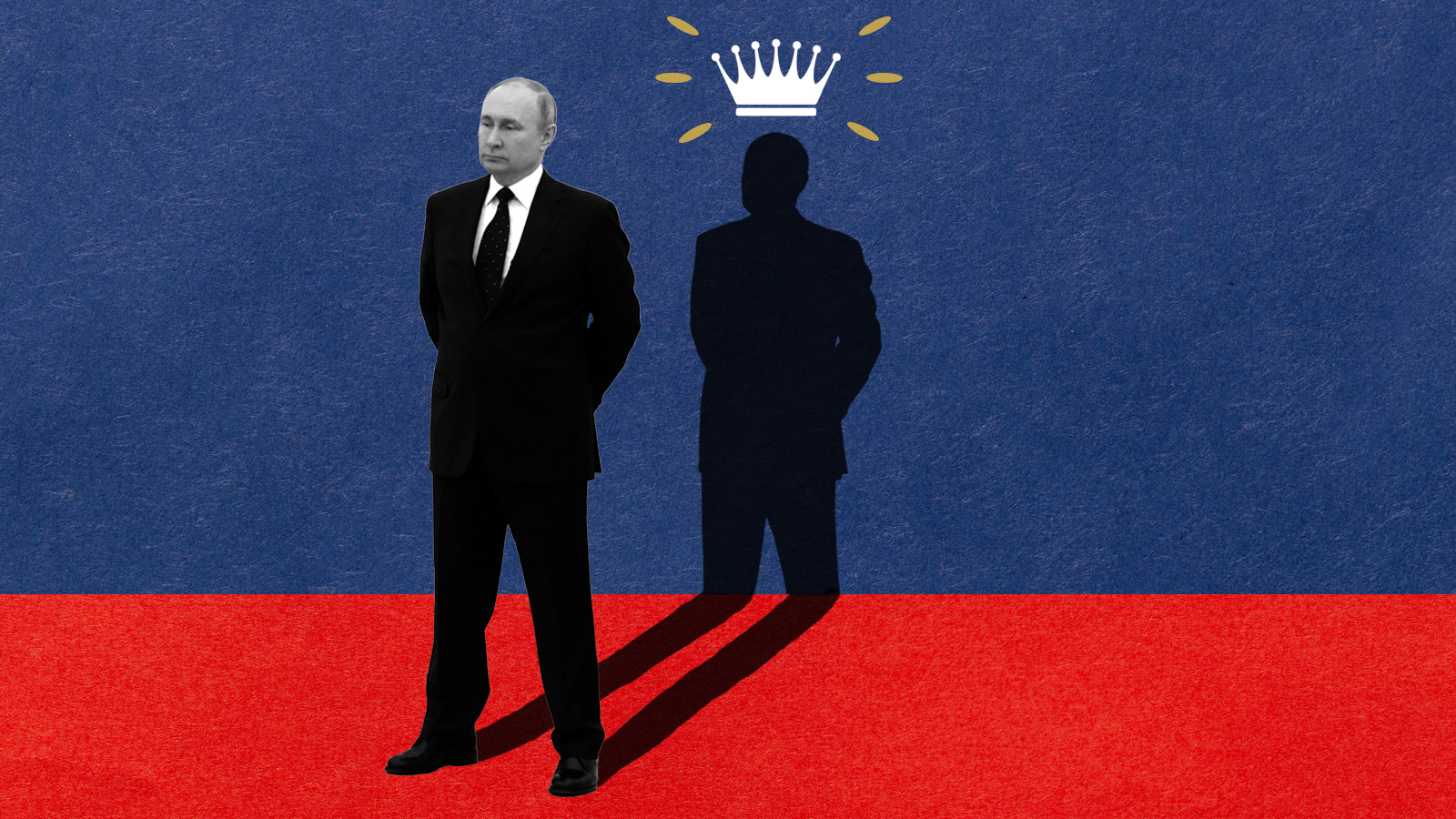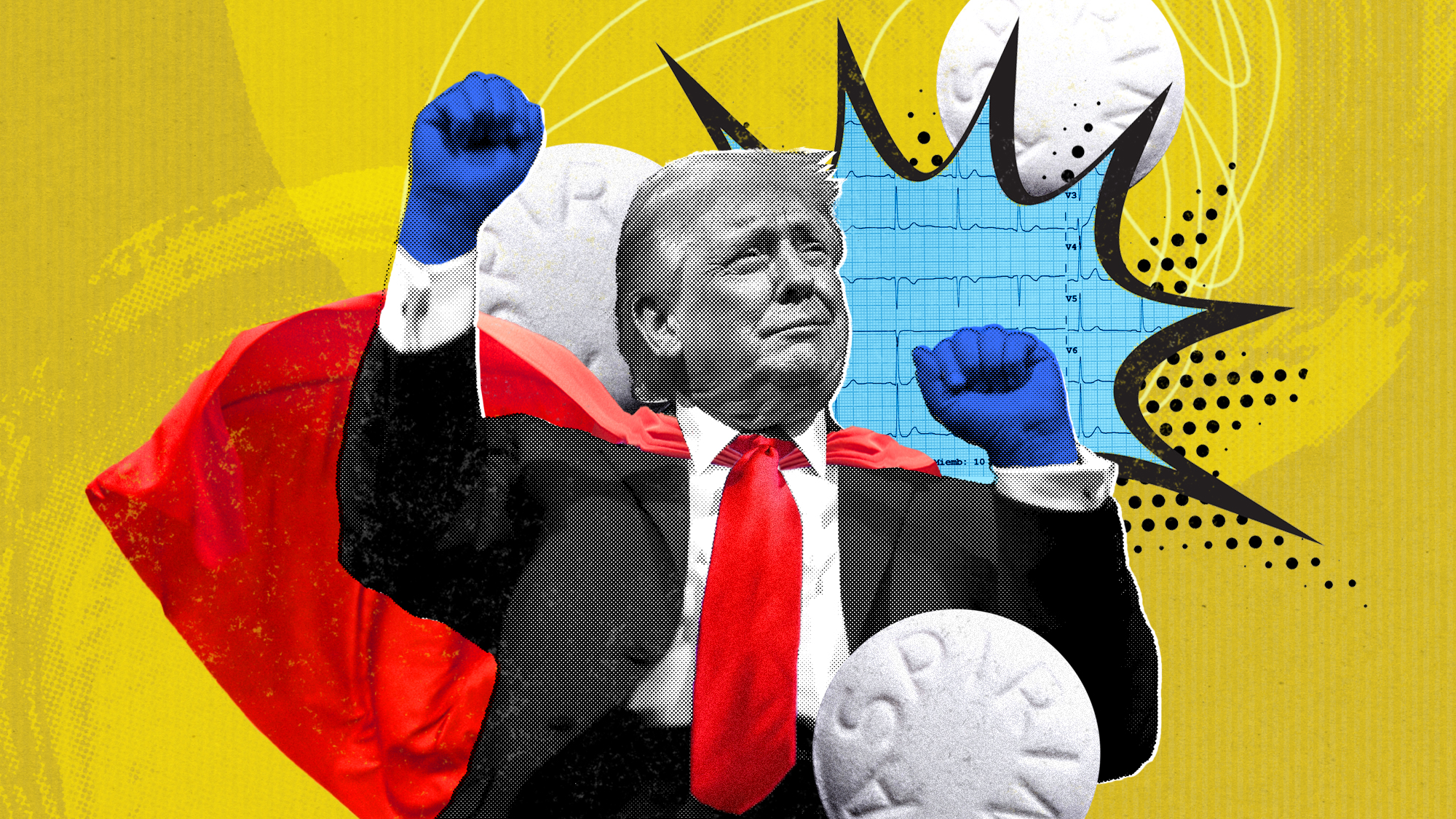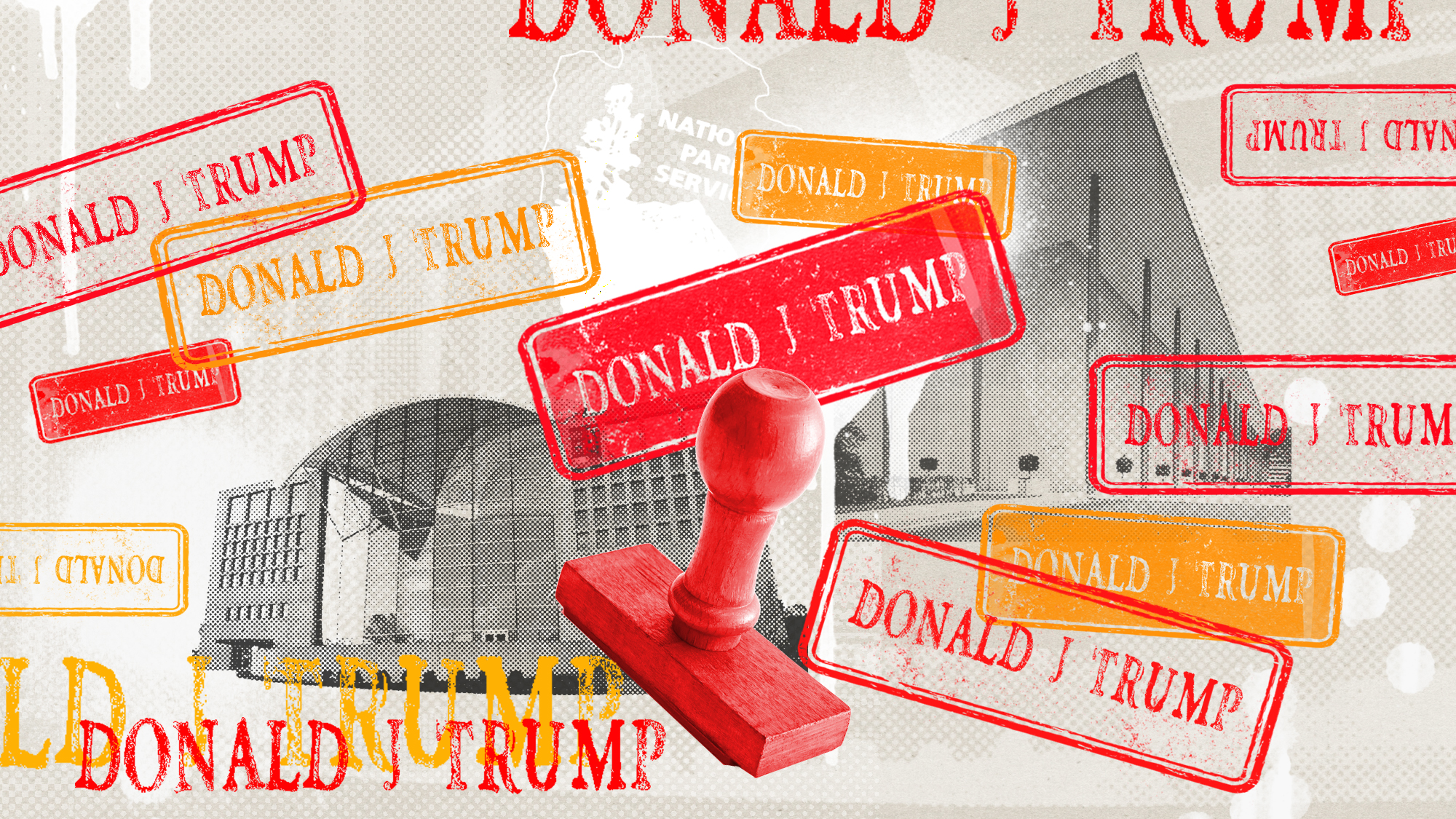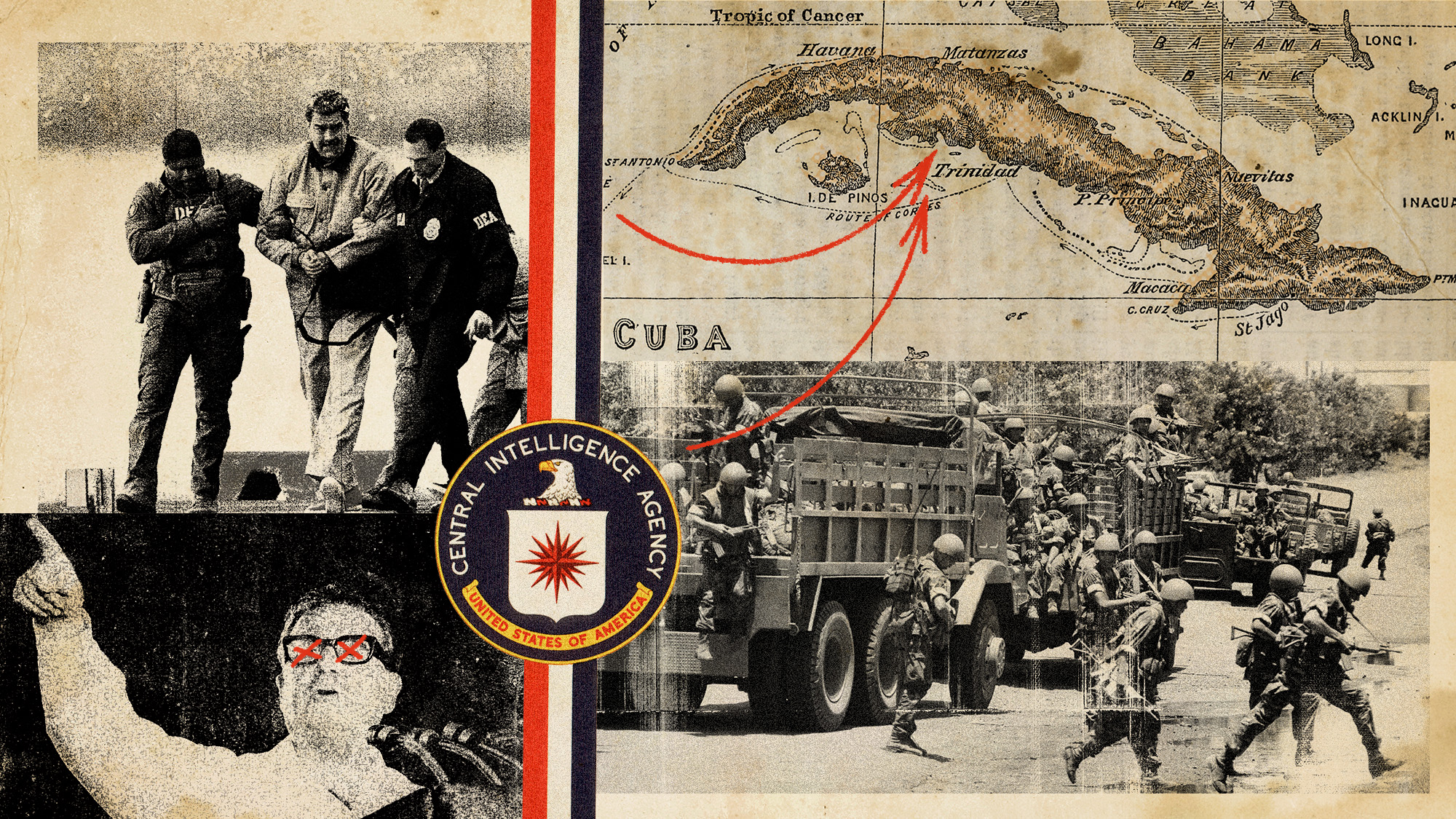The men who could succeed Vladimir Putin
As Russia's hopes for a quick Trump-imposed settlement to the disastrous war in Ukraine fade, the question of Putin's successors returns to the forefront


A free daily email with the biggest news stories of the day – and the best features from TheWeek.com
You are now subscribed
Your newsletter sign-up was successful
Throughout history, starting and then losing unprovoked wars has been a reliable way for dictators to forfeit their grip on power, either at the vengeful hands of the countries they targeted, via palace coups by disgruntled elites or occasionally even through uprisings by ordinary citizens weary of making sacrifices for a tyrant's deadly delusions. Within days of losing the Falklands Islands War to the United Kingdom in 1982, Argentina's General Leopoldo Galtieri, the leader of the embattled military junta that had launched the war to head off popular demands for new elections, resigned his office and started the process of restoring democracy. To say that things have not ended well for many individual dictators who tried to add territorial aggrandizement to domestic oppression, from Benito Mussolini to Saddam Hussein, is putting it lightly.
That stark history surely weighs heavily on Russian President Vladimir Putin, who has been Russia's increasingly brutal authoritarian leader throughout nearly the entirety of the 21st century and whose disastrous war of choice in Ukraine entered its fourth year in February, a conflict that has failed to "achieve almost any of his stated military objectives," said the Institute for the Study of War, "despite an estimated 900,000 Russians killed and wounded." While Putin's regime is currently in no danger of being overthrown by Ukrainian tanks surrounding the Kremlin, the longer the war drags on without a decisive military breakthrough, the more likely it is that Putin could be subject to removal from rivals inside Russia, or perhaps even tossed aside by the Russian people themselves, who are no strangers to revolution.
For a few weeks in early 2025, it looked like newly elected U.S. President Donald Trump was throwing Putin a lifeline, publicly dressing down Ukrainian President Volodmyr Zelenskyy in the White House, blaming the war on its Ukrainian victims and siding with Russia at the U.N. Security Council. But in March, Trump "refused to acquiesce to Putin’s top demand," which was "ending foreign military and intelligence aid to Ukraine," said the German Marshall Fund. Trump himself "appears to be rapidly losing patience with a faltering peace process that is showing few signs of progress," said The Atlantic Council, although it remains unclear if he is "prepared to turn up the pressure on Putin and increase the costs of continuing the invasion."
The Week
Escape your echo chamber. Get the facts behind the news, plus analysis from multiple perspectives.

Sign up for The Week's Free Newsletters
From our morning news briefing to a weekly Good News Newsletter, get the best of The Week delivered directly to your inbox.
From our morning news briefing to a weekly Good News Newsletter, get the best of The Week delivered directly to your inbox.
Putin's hopes that the Trump administration would quickly impose a Moscow-friendly settlement on Ukraine have so far been dashed. Meanwhile, the war grinds on, while Putin has had to rely on military reinforcements from North Korea, forging "a marriage of convenience or even a marriage of desperation," said RAND. Putin has also had to lean on Iran, inverting the longstanding patron-client relationship between Moscow and Tehran. Iran has made "substantial contributions to Russia's ground operations" as well as "delivered hundreds of short-range ballistic missiles to Russia," said the Carnegie Endowment for International Peace. Neither of these developments is a sign of strength for Putin and his regime.
The Russian economy is also starting to groan under the weight of long-term sanctions and its wartime footing. While the Russian economy has "repeatedly defied expectations" since the beginning of the Ukraine war, even seeing significant GDP growth, Putin is fighting to "manage a wartime economy" that is struggling to combat "rising inflation, sanctions pressure and record defense sector spending," said The Atlantic Council. With inflation approaching 9% and interest rates hiked to 23%, even Putin has been forced to admit "that the country’s economy is overheating," said CNBC. Russia's economy is in "an increasingly precarious state," said Reuters, despite contradictory claims from Moscow.
At 72, Putin is also entering the twilight of his life after dominating Russian politics for 25 years. A survey of more than 40 Russia experts conducted by Radio Free Europe/Radio Liberty (RFE/RL) in July 2024 found that 40% believe Putin will remain in power until he dies, while 23% expect a "palace coup." Just 3% of experts believe that Putin will ever leave voluntarily. But regardless of how it happens, there are several alternatives who may someday replace Putin as president of the Russian Federation. Putin himself "constantly considers potential successors and confirmed he has a list of candidates," said the Kyiv Independent, citing an interview the Russian strongman conducted with "pro-Russian state journalist Pavel Zarubin." Putin, unfortunately, did not reveal any names on his list.
Mikhail Mishustin
Russia's 59-year-old prime minister would be a logical choice for successor, and not just because he would become the interim president should Putin step away before his term ends. Mishustin was also regarded as Putin's most likely successor by Russia experts in the RFE/RL survey. A trained economist, Mishustin spent a decade as head of the country's tax bureau before his appointment as prime minister in 2020. Mishustin has been muted about the Ukraine war, and focused largely on containing the fallout from Western sanctions placed on Russia since the February 2022 war began — but he was reportedly opposed to Putin's decision to invade. That might make him well-placed to keep the basic structures of the Russian authoritarian regime intact, while making a strategic retreat or settling on less favorable terms than Putin has been willing to countenance.
A free daily email with the biggest news stories of the day – and the best features from TheWeek.com
Sergei Sobyanin
Moscow's long-time mayor, Sergei Sobyanin, has long been a rumored successor and was the second most popular choice among experts in the RFE/RL poll. The 66-year-old Sobyanin was born in Russia's Tyumen region and before embarking on a political career in the Soviet Union in the 1980s, worked in a metal pipe factory. A former regional governor who also served as Deputy Prime Minister of Russia between 2008 and 2010, Sobyanin is a close Putin ally and a member of his United Russia political party. His rise to prominence was helped by his "ability to toe whatever lines Putin has set on key aspects of Russia's internal policies while staying mum on some of the tricky-to-navigate external policies," said Olga Kiyan of Russia Matters. What makes him a top-tier contender to lead Russia after Putin is his success in keeping "Russia's capital running smoothly through mass opposition protests, the disastrous Covid pandemic and now regular Ukrainian drone attacks," said the Agence France Presse.
Dmitry Medvedev
Medvedev, 59, served four years as Russia's president from 2008 to 2012 before stepping aside for Putin in what was later revealed to be a prearranged agreement. The Leningrad native and former law professor is perhaps Putin's longest-standing ally, and he accepted the subordinate role of Prime Minister from 2012 to 2020. Now the deputy chairman of the Security Council of Russia, Medvedev has struck a belligerent tone about the war in Ukraine. "This conflict will last for a very long time. For decades, probably," he recently said to Russian news agencies, per Reuters. He has also threatened a preemptive nuclear strike if Ukraine were to try to acquire its own nuclear stockpile. Questions remain, however, about whether someone who has been so subservient to Putin for so long could take or consolidate power. The Spectator's Mark Galeotti recounted a joke purportedly making the rounds in Moscow, in which Medvedev looks for the steering wheel in a car and Putin pulls out a remote control from the passenger seat and announces he'll be the one driving.
Sergei Kiriyenko
Putin's 62-year-old first deputy chief of staff is a jack-of-all-trades who was most recently given the job of managing the sham referenda in the regions Russia seized from Ukraine in 2022. In the 1990s, Kiriyenko was known as a liberal reformer, so much so that then-President Boris Yeltsin made him the country's youngest-ever prime minister in 1998. But Kiriyenko's tenure coincided with the country's worst post-Soviet financial crisis, and he was forced to step down after four months. During his brief turn in office, Kiriyenko made the fateful decision to appoint Putin as the head of the FSB, the successor institution to the KGB. Kiriyenko is working hard "to make himself an irreplaceable cog in the wheels of power," said Carnegie Politika. As a Putin inner-circler, Kiriyenko would likely only get the top job if the succession process was managed by Putin or his allies.
Alexei Dyumin
Dyumin, 52, cut his teeth as Putin's bodyguard in the 1990s before ascending to play various roles inside the Russian state, including deputy director of the military intelligence bureau GRU, governor of Tula Oblast and now Secretary of the State Council. Dyumin was instrumental in spiriting pro-Russian Ukrainian President Viktor Yanukovych out of the country in 2014 after a pro-democracy uprising in Kyiv, and then served as a special forces commander in the successful operation to seize Crimea from Ukraine. Once a deputy to Defense Minister Sergei Shoigu, extensive rumors said Dyumin would take the place of his former boss, though he did not ultimately get the position. Dyumin's rise to power is emblematic of how Putin operates, identifying allies and then shuffling them from one position of authority to another inside the sprawling Russian state. This points to a "creeping process of late as the people closest to Putin," including bodyguards, "start getting appointed to key positions," said Mark Galeotti at War on the Rocks. If Putin were to step aside voluntarily, Dyumin "would be a top contender, thanks both to his long-time proximity to the Russian leader and his versatile professional experience," said the Davis Center for Russian and Eurasian Studies.
Quizzes by The Week
Nikolai Patrushev
Until May 2024, Patrushev was the secretary of Russia's Security Council. He was also a leading proponent of the idea that there is a Western conspiracy to weaken or possibly break up the Russian Federation. The 73-year-old has known Putin since they worked together in the KGB, and became a major strategist in both the 2014 and 2022 invasions of Ukraine. "His ideas form the foundations of decisions taken by Putin. He is one of the few figures Putin listens to," said Tatiana Stanovaya to The Washington Post in 2022. "Washington and London are again conniving with Nazism and fascism," Patrushev said in a March 2023 interview with Russian newspaper Rossiyskaya Gazeta. "They have no qualms about using Ukraine to set Europe or the entire world ablaze in a belief that they can get away with anything." During the war, Patrushev traveled widely, seeking to shore up Russia's diplomatic position and playing a critical role in managing the alliance with China. But after he was replaced on Russia's Security Council by Sergei Shoigu, Patrushev's star seems to have dimmed. Patrushev's 47-year-old son Dmitry, currently deputy prime minister for agriculture, is another rumored Putin successor. The younger Patrushev has "has made a dizzying career" and "regularly attends Kremlin meetings with Putin," said RFE/RL.
Other possibilities
Before his 2023 assassination, Wagner Group mercenary leader Yevgeny Prigozhin would also have been considered a potential successor; but in Putin's Russia, it is dangerous to be seen as having too much ambition. One name that has vaulted to the top of the potential successors list is Andrei Belousov, who was named Russia's new defense minister in May 2024. An economist by training, the 66-year-old Belousov had served as first deputy prime minister from 2021 until his appointment as defense minister. Another close Putin ally, Belousov would likely carry on with most of Putin's policies both inside and outside of Russia. The change at the defense ministry likely means that Sergei Shoigu, the outgoing minister, is on the outs with Putin, particularly given the trajectory of the war he had been tasked with overseeing. Shoigu did not receive any votes in the RFE/RL survey of Putin successors despite his appointment as Secretary of the Security Council of the Russian Federation.
There is also 66-year-old Dmitry Kozak, a former deputy prime minister and now deputy Kremlin chief of staff, who reportedly worked out an agreement with Ukraine prior to the war that Putin rejected.
In the event of a full rupture of the regime itself, of course, the list of possibilities would not be limited to Putin loyalists and other Kremlin insiders. Opposition leader Alexei Navalny would have once been the most prominent politician who could seek to lead a post-Putin Russia, but he died in prison in February 2024. Putin has had some opposition leaders, like Boris Nemtsov, assassinated, while others, like tycoon Mikhail Khodorkovsky, live in exile.
Remaining regime opponents like Khordokovsky are "trying to build a coalition with grassroots anti-war groups across the world and exiled Russian opposition figures" that includes "Russian chess legend Garry Kasparov, Mikhail Kasyanov, a former Russian prime minister and Vladimir Kara-Murza," said The Associated Press. Kara-Murza, a political activist and journalist, was released from a Russian prison in 2024 as part of a prisoner exchange and now lives in exile. But it is not clear how much support, if any, these figures have on the ground in Russia.
David Faris is a professor of political science at Roosevelt University and the author of "It's Time to Fight Dirty: How Democrats Can Build a Lasting Majority in American Politics." He's a frequent contributor to Newsweek and Slate, and his work has appeared in The Washington Post, The New Republic and The Nation, among others.
-
 What is the endgame in the DHS shutdown?
What is the endgame in the DHS shutdown?Today’s Big Question Democrats want to rein in ICE’s immigration crackdown
-
 ‘Poor time management isn’t just an inconvenience’
‘Poor time management isn’t just an inconvenience’Instant Opinion Opinion, comment and editorials of the day
-
 Bad Bunny’s Super Bowl: A win for unity
Bad Bunny’s Super Bowl: A win for unityFeature The global superstar's halftime show was a celebration for everyone to enjoy
-
 Witkoff and Kushner tackle Ukraine, Iran in Geneva
Witkoff and Kushner tackle Ukraine, Iran in GenevaSpeed Read Steve Witkoff and Jared Kushner held negotiations aimed at securing a nuclear deal with Iran and an end to Russia’s war in Ukraine
-
 ‘The forces he united still shape the Democratic Party’
‘The forces he united still shape the Democratic Party’Instant Opinion Opinion, comment and editorials of the day
-
 ‘The mark’s significance is psychological, if that’
‘The mark’s significance is psychological, if that’Instant Opinion Opinion, comment and editorials of the day
-
 A running list of everything Donald Trump’s administration, including the president, has said about his health
A running list of everything Donald Trump’s administration, including the president, has said about his healthIn Depth Some in the White House have claimed Trump has near-superhuman abilities
-
 Trump’s ‘Board of Peace’ comes into confounding focus
Trump’s ‘Board of Peace’ comes into confounding focusIn the Spotlight What began as a plan to redevelop the Gaza Strip is quickly emerging as a new lever of global power for a president intent on upending the standing world order
-
 A running list of everything Trump has named or renamed after himself
A running list of everything Trump has named or renamed after himselfIn Depth The Kennedy Center is the latest thing to be slapped with Trump’s name
-
 A running list of the international figures Donald Trump has pardoned
A running list of the international figures Donald Trump has pardonedin depth The president has grown bolder in flexing executive clemency powers beyond national borders
-
 A running list of US interventions in Latin America and the Caribbean after World War II
A running list of US interventions in Latin America and the Caribbean after World War IIin depth Nicolás Maduro isn’t the first regional leader to be toppled directly or indirectly by the US
